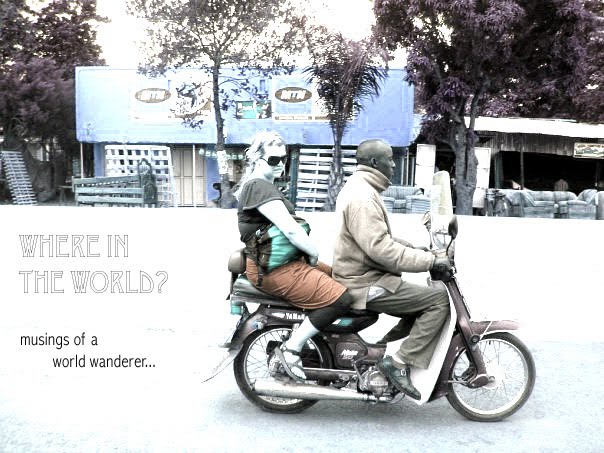A few musings about Uganda...
Walking through other people’s yard to get to where you’re going
at first seems unnatural, but Ugandans don’t really understand trespassing as Americans do. People often traipse through other’s yards to get to the house they’re visiting—in fact, it is often the only way to get to that house. The neighbors are usually friendly and often say hello (or otherwise ignore you, or stare at you if you’re white)—it’s not weird even though it seems you’re cutting through their property. The sense of property is pretty fluid. That said, I think it’s much less common to enter someone’s walled and gated compound without invitation.
It is often said of Africans in general that they are much more community oriented than our more individual-oriented American society. Cutting through people’s yards on a regular basis you might think confirms this belief, but I was discussing this with Lauren, and we’ve come to the conclusion that they function on a basis of anonymity more than not—they may be polite in addressing one another, shooting the breeze and such—everything seems to include a 40 minute conversation. But people here don’t seem to know their neighbors, and don’t typically greet strangers in passing, even on emptier village roads (eye contact doesn’t seem frequent). I think this is sad—I’m used to smiling at strangers and offering a hello when I’m in a less crowded setting, and I’m certainly used to knowing the neighbors.
Personal space
doesn’t really exist. Physically or audially-- people don’t really keep to themselves. Like on taxis, they take as much space as they want, whether is encroaches on the next person or not—and the other person doesn’t really seem to mind, because maybe at the same time, they do the same. Maybe this is because they believe all space is shared—because they’re not afraid to squish if they need to, and don’t complain when the conductor adds three more people than comfortably fit in the taxi—in fact the conductor usually sits on top of at least somebody when the door closes and the van starts moving… Also, the music is very loud. Sometimes huge trucks come through with blaring speakers on a flat bed, I’m not really sure why. And CD shops will have the music blasting, until late hours of the night—we always wonder why the music is still going on at 11 pm when we’re trying to get to bed. This certainly wouldn’t go down well with the Provo Police. Also, sometimes passengers in the taxi will whip out their cell phones and play ringtones as they travel—on top of the van stereo—so you have this cacophony of music and sounds from different sources, yet no one seems to shoot dirty looks at the music-playing passenger because apparently his behavior is acceptable (but not to us Muzungus, who do shoot him dirty looks- we don’t want to have to shout our conversation over Michael Bolton or anything like it, thank you.)
The roads
are really sad. It is very lucky if you can get to wherever you’re traveling to from Kampala but only paved roads, but even the paved highways are treacherous. Uganda roads have a huge problem with potholes. They become so huge that they take up and entire “lane”, and taxis loaded with passengers chance their luck at games of chicken as they confront the oncoming lane. However, most large trucks can’t avoid these potholes because of their massiveness. As a result, they can really slow down traffic when they have to negotiate a pothole. Occasionally, fuel trucks, or any other truck carrying a liquid, won’t slow down enough for the pot holes and hitting the pot hole will cause the liquid inside to slosh so violently that not only do the trucks get off balance, but at times they can even become airborne, flipping upside down and landing on its top. We saw the aftermath of such an accident. The truck was completely mangled and there was a massive fuel spill. And there were throngs/hordes of people lining the highway not as curious onlookers, but combing the wreckage site and looting the fuel by skimming their yellow jerrycans across the puddles.
The obsession with Christian phrases
is pretty ubiquitous in Uganda—they are plastered all over signs and many businesses and schools use them in their names. Usually the phrases are in English, but you can find them in Luganda, too; the title of this post is something I copied down from a block in a village that I passed on a boda boda. I asked my trusty driver Ahcef what it meant: The Lord is My Shepherd. Some others I’ve seen :
Trust in God Restaurant
Christ is lord Dress Shop
His Grace Tailoring Shop
Also, the taxi vans put these phrases in huge metallic letters that take up a fourth of the rear window/windshield, such as:
God Bless, Jesus Saves, Jesus is King, God Loves Us, I Am Blessed, Good is Good, (and my personal favorite) Life is Suffering.
(can you make out what it says at the top of the building? "Jesus is the way...Smart Boutique")
Friday, June 27, 2008
Mukama ye Musumba Wange
Posted by b.lowe at 8:16 AM
Labels: curious christianisms, Uganda
Subscribe to:
Post Comments (Atom)



3 comments:
Loved this. My family and I just spent 11 hours today in the car driving to Illinois for our family reunion. Hannah was complaining that the road was too bumpy and kept knocking the itrip out of the cigarette lighter thing. All I could think was that that road was smoother by about 200X than any road in Uganda.
This is awesome. I wish I could say the local Sacred Heart Dental is comparable, but I don't even think it's in the same category. :-)
Smart is the way they refer to sharply dressed. Ie. "You look sharp today." Is what Ugandans mean when they say "you look smart."
Post a Comment